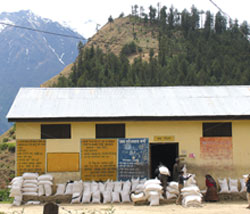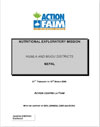But while a six-month drought decimated the wheat crop, dangerously stretching the annual 'hunger gap' between harvests, long-term neglect by successive central governments has left the people perhaps more malnourished than anywhere else in the country, according to a recent assessment.
In February and March, French NGO Action Contre la Faim visited Mugu and neighbouring district Humla to assess the health situation, particularly of children.
 "It can be concluded that the acute malnutrition in the 10 surveyed VDCs is more alarming than expected and is an issue that needs to be addressed in terms of treatment and also in terms of prevention," says the report of that mission.
"It can be concluded that the acute malnutrition in the 10 surveyed VDCs is more alarming than expected and is an issue that needs to be addressed in terms of treatment and also in terms of prevention," says the report of that mission. "Results obtained by the exploratory mission.are in contradiction with the (belief) that acute malnutrition affects most the tarai than the mountain areas of Nepal. Higher acute malnutrition prevalence has been found in Humla and Mugu compared to the national rate."
ACF also discovered that children less than 30 months are 5.5 times more likely to be malnourished than children aged from 30 to 59 months. And 20.8 percent of women suffered night blindness during their last pregnancy, a result of Vitamin A deficiency.
The drought and extended hunger gap might have affected these results, concludes the report. "But the causes of malnutrition are multi-factorial and the nutrition situation is also linked with a lack of diversified foods, with poor hygiene practices, with lack of women education and very poor availability of public health services".
Seventy VDCs within the 10 districts are 'severely affected' with crop failures of 75-100 percent, according to the WFP's de Margerie, based on three on-the-ground assessments.
"People are starting to resort to damaging coping mechanisms," he said. "they're starting to cut the number of meals or the size of meals, selling livestock and tools and even migrating. "
The WFP emergency operation will include fortified wheat flour for families with children under two and pregnant or nursing mothers, along with the rice allotment they will get at the start and end of a 20-day food for work programme, he added. "Hopefully, it will be the first and last time we'll have to do this."
 ACF recommends:
ACF recommends: . Improving water and sanitation by increasing access to potable water, implementing irrigations systems and improving hygiene practices
. Increasing the quantity of food available and helping people to diversify their diets
. Promoting and supporting iron/folic acid and de-worming distributions to decrease anaemia
. Promoting the use of adequately iodised salt.
. Improving communities' knowledge about nutrition and hygiene
. Treating moderate acute nutrition by implementing supplementary feeding centres for preschool children and women
. Introducing improved cooking stoves in households
. Studying the nutritional and medicinal values of local products


